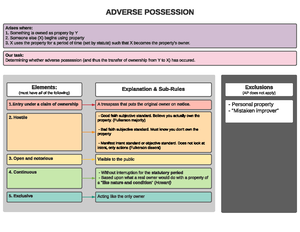

Accession Ad Coelum Accretion/Avulsion Fixtures Mistaken Improvers Adverse Possession Actual Exclusive Open and Notorious Adverse Under Claim of Right (Hostile/no permission from owner) Continuous (for the statutory period) / Tacking Finders Creation/Intangible Property Right to Exclude Trespass Encroachments Control of Privately Owned Spaces Licenses Bailments Limits/Necessity/Public Accommodation Public Use & Access/Public Trust Doctrine Co-Ownership (Tenancy) Recording (Land Transactions/Deeds/Title/Mortgages)
Leaseholds Types of Leaseholds Fair Housing CQE IWH Constructive Eviction Termination of Lease Transferring Lease Assignment Sublease Common Interest Communities Nuisance Water Rights Zoning Eminent Domain Regulatory Takings Penn Central Factors ● Diminution in Value (Denominator) ● Interference w/investment backed expectations ● Character of the regulation Per Se Taking (Physical - Loretto) Total Wipeout (Lucas) Exactions Essential Nexus Sufficiently Close Connection
Present Estates Fee Simple Absolute ● Not susceptible to termination Life Estate Absolute ● Only terminates at the end of life Can the estate be “de-feased” by some event? Fee Simple (Defeasible) or Life Estate (Defeasible) ● Can be brought to an end by occurrence of some event Subject to Condition Subsequent (back to the grantor - words of condition) ● Granted ownership only ends when grantor exercises right to retake the property, right of entry) ● “But if” Determinable (back to the grantor - words of duration) ● Limitation event ends the fee automatically and immediately, the grantor is now the owner ● Possibility of reverter ● “So long as” Subject to Executory Limitation (future interest to someone other than the grantor, third party or just the named person) ● Limitation event ends the fee automatically and immediately; named holder of the future interest is now the owner ● Cuts short a pre-existing fee Future Interest in Grantor Life Estate Absolute ends naturally and goes back to grantor, that’s Reversion Possibility of Reverter from Fee Simple Determinable Right of Entry from Fee Simple Subject to Condition Subsequent Future Interest in Grantee Executory interest*
interest) ● An Executory Interest can divest a vested interest. ● Shifting: cuts short estate or interest of a recipient in a conveyance ● Springing: cuts short estate of grantor Life Estate Absolute ends naturally and the next grantee is a third party, that’s Remainder
Types of Remainders: Contingent Remainder****
happen or not ● Recipient is not yet ascertained and/or some event needs to happen first “a condition precedent” - some prior event - for interest to become possessory ● Interest will only become possessory IF some event happens first Indefeasibly Vested Remainder ● Identity of taker is known ● No prior condition required other than natural end of the prior life estate ● No further act “condition subsequent” that can take away the remainder Vested Remainder Subject to Complete Divestment ● Future holder is known, but something “condition subsequent” - some following event, could take interest away before it vests in possession ● Hard to distinguish from Contingent Remainder ● Holder of the remainder is known, but can lose it Vested Remainder Subject to Partial Divestment***** ● “Subject to open” - set of possible future interest holders is not yet closed ● Vested (holder of future interest is known) BUT the set of possible future-interest-holders is not closed, so known holders might get less **Vested means it's clear where it should go